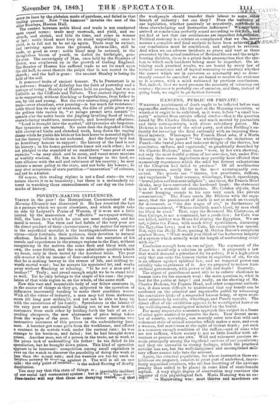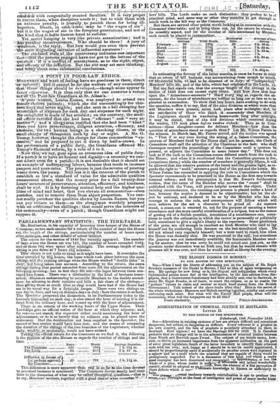HANGING, PUBLIC Oft PRIVATE?
WHETHER punishment of death ought to be inflicted before vast ragamuffin audiences, like the mob at the Manning execution, or whether it ought to be exhibited, as it were, before "a small tea- party" selected from certain official circles—that is the question raised by Mr. Charles Dickens, and much mooted by journalists and their correspondents, with divers subsidiary points. Mr. Dickens is in favour of the select party, and cites Fielding's au- thority for investing the fatal extremity with an imposing thea- trical mystery. Whereupon Sir Francis Head asks, if a Maria Manning is to be spared " 'the whistlings—the imitations of Punch—the brutal jokes and indecent delight of the thieves, low prostitutes, tuffians, and vagabonds,' so graphically described by Mr. Charles Dickens," since those "were, by her own showing, not only the most fearful portion of her sentence, but, under Pro- vidence, these coarse ingredients may possibly have effected that momentary repentance which the mild but fervent exhortations of the Chaplain had failed to produce." Of all machineries for conversion, surely this is the most extravagantly con- ceived. The priests are "thieves, low prostitutes, ruffians, and vagabonds " ; their sermons, whistlings, Punch squeakings, "brutal jokes and indecent delights"; and these, Sir Francis Head thinks, may have converted the hardened heart : the statement is in itself a reductio ad absurdum. Mr. Cobden objects, that "secret hanging sounds to his ears very much like private assassination." The Times meets Mr. Dickens with the argu- ment, that the punishment of death is not so much an example for determent, as "the due wages of sin," in furtherance of the commandment, " Whoso sheddeth man's blood, by man shall his blood be shed." That, says the Reverend Mr. Christmas, of Sion College, is not a command, but a prediction ; for Cain was not killed, neither was Moses for slaying the Egyptian. We are not, rejoins the Times, with much witty sportfulness, discussing the Egyptian laws ; and as to Cain, his exemption was special. But, says the Daily News, quoting M. Odilon Barrot's complaint against Rome, "What would you think of the barbarous iniquity of a system which actually went the length of confounding crime with sin?"
Confusion enough here on one subject. The argument of the Times is manifestly a solecism in politics : it propounds a law that would demand a priesthood for its police; it is a high-priest only that can seize the human victim in expiation of sin, for sin is an offence against spiritual law, and no temporal power can suitably take cognizance of it. Are we prepared to restore hier- archical government, with power of life and death ? Scarcely. The object of punishment must still be to enforce obedience to- human laws for the common weal : the main question is, what is best for the public at large ? and really, on the showing of Mr. Charles Dickens, Sir Francis Head, and other competent authori- ties, it does seem difficult to understand that any benefit can be conferred on the criminal and ragamuffin public by witnessing the convulsive kicks of a suspended human being, or upon mori- bund criminals by catcalls, whistlings, and Punch squeaks. The direct effect of the exhibition appears to be unmitigated horror on the well-disposed, unmitigated mischief on the brutal. For many respectable reasoners approach this subject in a frame of mind quite unsuited to perceive the facts. Your decent mem- ber of society, nowadays, can scarcely enter into that wild and vehement state of animal sensation wlich makes a man, and even a woman, feel murderous at the sight of violent death ; yet such is a common enough condition of the ruffian—and of some who are not ruffians, where society is not so little familiar with ad- venture or passion as our own. Wild and vehement passions. re- main principally among the vagabond sections of our population; and they are amenable to stormy feelings, which the practised novelist can see, but the well-disciplined and accomplished mili- tary officer cannot take into the account. Again, the criminal population, for whose instruction these ex-
hibitions are prepared, conaists in great part of underbred, imper- fectly organized creatures, who are less deserving of the extreme penalty than suited to be placed in some kind of semi-lunatic asylum. A very slight degree of observation may convince the inquirer of this physiological fact. Maria Manning was an ex-
1
"es Mainwaring was : most thieves and murderers are
cattirki with congenitally stunted faculties.' g1T—ki Very 'proper trresieree_them,_whezi--diseiplinesseedreit ;- but t6 A-Sit-them with in extreme penalty:,is.litera)17, tor punish them for being ill- begotten. Death, in atfoh/bakes1 -1111hy be "the wages of sin " ; but it is the wages of sin -in the foregone-generations, and not of the hiedIlleilegko hPinanshand tmenfotce.' Yet .sperc .apging.je: yery„like private- assassinsition ; and it bia indonfenieer -V1,7,b,o should, be there A jury of it, -is the repld iiw mould you even then prevint ,enu dYnt"'State,'Ifsr kdWtistingWtriiMfei n tie', amateurs t, grby indicates ens interr1t
ant
e-Persoe yeinot got tfi tins bettaterof +the
tArtffisti :nt is a conii to-itheright,[eilijetit,
.f,161111,' caCV of the intif et tIte,etiz may set min thinking,
b,tind about somn'iu atinhalzenclusions.



























 Previous page
Previous page